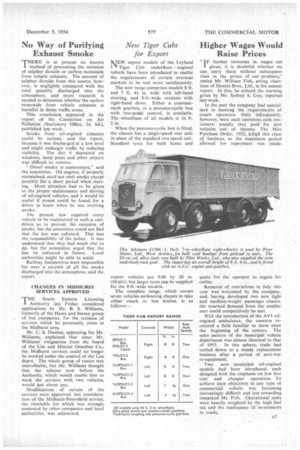No Way of Purifying Exhaust Smoke
Page 47

If you've noticed an error in this article please click here to report it so we can fix it.
THERE is at present no known method of preventing the emission of sulphur dioxide or carbon monoxide from vehicle exhausts. The amount of 'sulphur dioxide from this source, however, is negligible compared with the total quantity discharged into the atmosphere, and more research is needed to determine whether the carbon monoxide from vehicle exhausts is harmful in dense traffic areas.
This conclusion appeared in the report of the Committee on Air Pollution (Stationery Office, 2s. 6c1.), published last week.
Smoke from oil-engined exhausts could be serious, said the report, because it was discharged at a low level and might endanger traffic by reducing .visibility. The dirt it deposited on windows, lamp posts and other objects was difficult to remove. " Diesel smoke is unnecessary," said the committee. Oil engines, if properly maintained, need not emit smoke except possibly for a short period when starting. More attention had to be given to the proper maintenance and driving of oil-engined vehicles, and it would be useful if means could be found for a driver to know when he was emitting smoke. The present law required every vehicle to he maintained in such a condition as to prevent the emission of smoke, but the committee could not find that the law was enforced. This was the responsibility of the police. It was understood that they had much else to do, but the committee urged that the law be enforced in future. Local authorities might be able to assist. Railway locomotives were responsible for over a seventh of all the smoke discharged into he atmosphere, said the report.
.CHANGES IN MIDHURST SERVICES APPROVED
THE South Eastern Licensing Authority last Friday considered applications by Mr. B. S. Williams, formerly of the Hants and Sussex group of bus companies, for the revision of services which he personally owns in the Midhurst area. Mr. C. S. Dunbar, appearing for Mr. Williams, explained that since Mr. Williams' resignation from the board of the Liss and District Omnibus Co., the Midhurst services could no longer be worked under the control of the Liss depot. The whole group of routes was unprofitable, but Mr. Williams thought that the scheme now before the Authority, which would enable him to work the services with two vehicles, would just about pay. Modifications of certain of the services were approved, but consideration of the Midhurst-Petersfield service, the timetable for which was strongly contested by other companies and local authorities, was adjourned.
















































































































